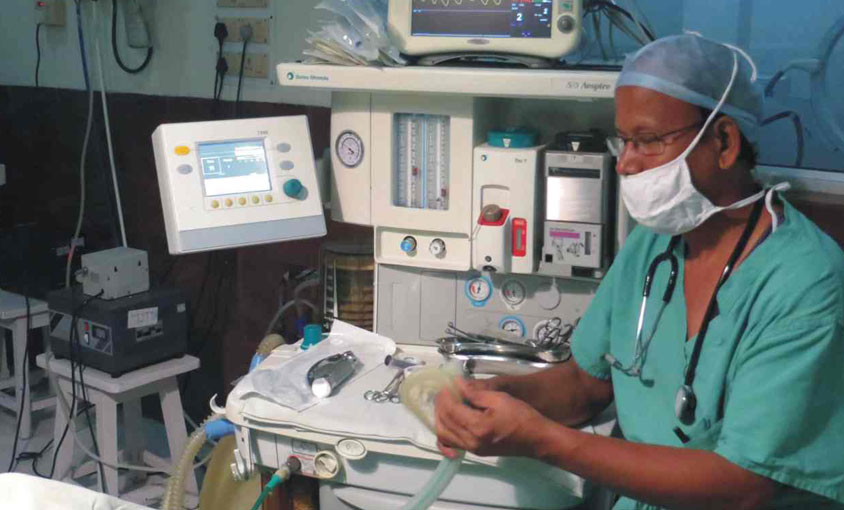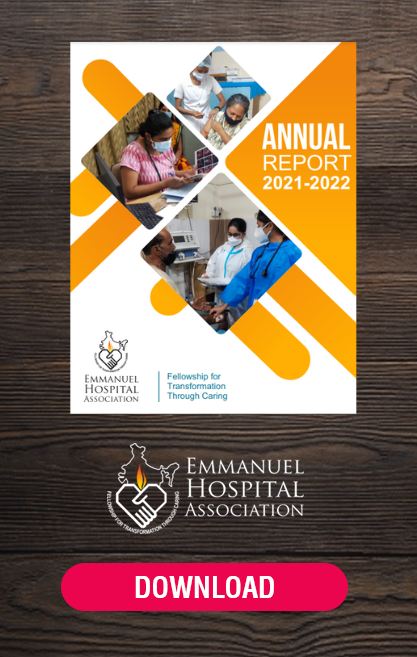We live in an age of fast changing technologies, unethical practices, increasing unhealthy competition, new inventions in medical field, more specialization, and high community expectations, and over the past year there were times when we as an organization felt irrelevant and outdated. But we were continuously reminded by the Lord about the primary purpose for which he started the EHA ministry, and were taught to trust and depend on Him in every situation. All hospitals continued to adapt to external changes and kept the light burning as witnesses for the King who has called us to serve Him. We thank God for his continued presence with us.
Strategic Plans: The process for developing the next EHA strategic plan started with a small group of seniors coming together, facilitated by Dr. Vijay Aruldas, Vice Chairperson of EHA Board. After reviewing previous years’ plans and considering emerging needs and changing contexts, improving operational excellence in all support systems emerged as a key factor. In the next strategic plan, we hope to consolidate the last two cycles of plans, and move ahead to respond and reposition ourselves appropriately, to be relevant to the context, and vision of EHA. Based on the emerging directions, all hospitals will make a final five-year plan by the end of this financial year.
Changing Laws and requirements: Though all States have not adopted Clinical Establishment Act (CEA), the requirements by the present State Acts and other regulations have become more unrealistic and stringent to comply with, particularly when it is already a challenge for health professionals to work in rural areas. The major challenge under the Act faced by the hospitals is the inability to meet HR requirements. Mission hospitals in the country are going to face further hardships and existence itself is at greater risk unless there will be change in laws applicable to rural and urban health setups. Hospitals in Assam, Maharashtra, and Madhya Pradesh had to face ongoing difficulties with hospital registration under CEA. Different strategies are required to meet this ongoing challenge if we have to be relevant and fulfill the vision. Some steps were taken in this direction but lots more needs to be done at all levels. As one of the founding members of CCHI (Christian Coalition for Health in India), EHA continued to contribute and be part of the larger body of Christian healthcare force in this country.
Quality Improvement and NABH: There were continuous efforts to improve systems and quality in the hospitals. Makunda and Tezpur hospitals have started the process of implementing ‘National Accreditation Board for Hospitals & Healthcare Providers’ (NABH) entry-level standards and hope to be accredited by the end of this financial year. Other hospitals have also started appointing quality coordinators and working towards NABH implementation. The Grant Thornton carried out diagnostic review of process and systems and the review has helped to identify gaps that need to improve. Plans are being made to work on developing SOPs with an aim to standardize processes and also train process champions across EHA.
Legal Challenges: We saw positive closure of few encroachment cases and consumer cases; and positive progress of the case proceedings in few criminal cases. Madhepura Hospital had to face severe challenges with one of the staff being put behind bars under false allegation, and closure of pharmacy services due to technical issues. The staff is out on bail and the pharmacy reopened. The ongoing legal struggles at Makunda and Robertsganj are matters of concern. Encroachment cases, land related disputes, consumer related cases require continuous focus and close monitoring of the status. The local authorities and well wishers in the community were supportive. The two senior advocates Mr. Samuel Abraham and Mr. Sudarsh Menon continued to be our legal consultants on retainer basis and were a great help in dealing with these legal issues. Handling legal litigations has taught important lessons and helped us to take both preventive and corrective steps.
Infrastructure Development: Infrastructure development continued to be a focus area across EHA units. It is a critical component for sustainability, providing quality care, creating reasonably good workenvironment, complying with required statutory requirements and for retaining professional staff. An infrastructure development team was formed and it is hoped that it will lead to coordinated efforts and quality of construction in the coming years. Staff quarters, patient areas and renovations of existing buildings are going to be the focus for the coming year. With the changes in Indian Nursing Council requirement, most of the nursing schools in EHA have to build skills labs, expand and build new buildings. Hospitals continued to set aside and give priority for infrastructure development and up-gradation of medical technology by using local revenue. Raising and generating external resources is a major challenge. We thank the Lord for the provisions He has made thus far and acknowledge the contributions made by donors towards infrastructure development. A lot more needs to be done to generate resources apart from patient revenue and few donors.

Tapping funds under CSR: We have not been very successful in getting significant funds under Corporate Social Responsibility (CSR). In the coming year we plan to actively explore all possibilities. Initial seed money has been allotted towards CSR initiatives with a clear aim to make EHA known in wider circles and attract funds accordingly. A Donation portal has also been setup.
Partnerships and Networking: The hospitals continued to take active role in partnering with Government programs like JSY, RSBY, NRHM, SBA training. Though these partnership programs have been beneficial to the community, there were challenges with timely reimbursement. This has led to problems with cash flow in many hospitals. Our commitment to the poor and marginalized communities keeps us committed to these programs initiated by the Government. We hope to see much improved coordination and reimbursement system in the coming year.
Financial and Material Management: Systems were streamlined and strengthened in these two areas and the capacity of staff involved in these areas built. Steps were taken by the new finance director and his team to bring required changes to finance management, preparation of reports and conducting audit. Continuous training of staff is key for rising to higher standards of financial management across the organization. Handling Income Tax related issues are ongoing challenges. There is a plan to have a tax consultant on retainer basis to provide required insight and guidance in dealing with IT related matters. Training of existing admin staff and attracting committed admin professionals with domain expertise is one of the focus areas in the coming year.
Performance of Hospitals: Overall there has been an increase in patient numbers. Due to lack of consultants, five of the hospitals continued to face financial constraints. With clear plans to reposition and rebuild we hope to see a turn-around and stability in most of the struggling units in the coming year. Major income for the hospitals continued to be patient revenue. Donor dependency ratio is between 5-8 %. Sustaining less than 100-beds hospital continued to be a herculean task and a complete paradigm shift and new strategy is required to achieve financial sustainability.
At the end: Can we be relevant and progressive in the changing context, without diluting and losing our primary call? Collective efforts are required at all levels to hold on to the core as a non-negotiable factor, and at the same time focus on fulfilling all the mandatory requirements applicable to hospitals, improve quality of care, and grow both vertically as well as horizontally. Commitment and togetherness of leadership at all levels is key for EHA to remain relevant and a vibrant Christian Healthcare
movement in this country.



